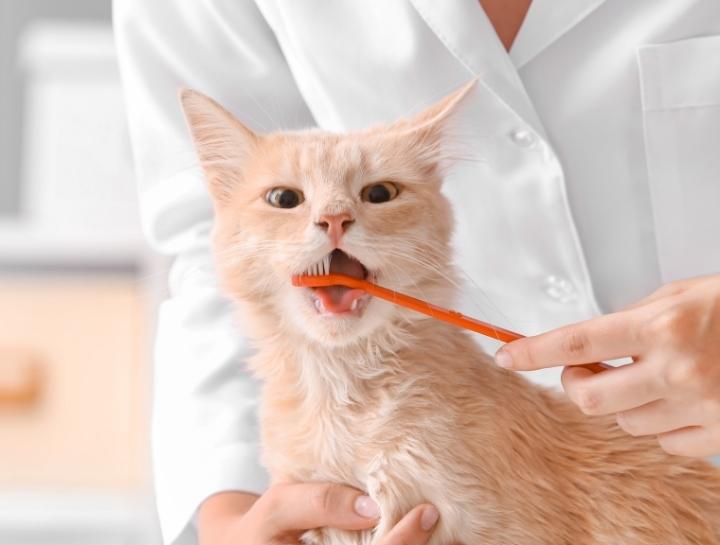Feline Dental Care
Prevention of periodontal and dental disease is vital for your new kitten as 90% of cats develop dental problems during their lifetime. Like us, your new kitten can develop gum disease, tartar and plaque build-up, foul breath, and abscesses, all of which can develop into infection and tooth loss. We want to empower you to take action against these problems by providing information on proper dental care, diet, and treats for your kitten.
Breed is a factor that predisposes some cats to dental disease. Smooshed-faced breeds such as Persians, Chinchillas, British and Exotic Shorthairs have shortened faces that can result in abnormally positioned teeth, sometimes severely so. Their jawbones are often too small to accommodate the teeth, resulting in overcrowding and misalignment of teeth.
To protect your cat’s oral (and overall) health, there are a few things you need to do. These involve both regular home and annual veterinary dental care.
First, you need to know what a healthy cat’s mouth should look like. The teeth should be clean, white, and free of any chipping. The gums shouldn’t have any sores or lesions and should be pink and healthy without any redness, swelling, or bleeding. Your cat’s breath shouldn’t have a foul odor. If it does, this can be a sign of infection either in their mouth or an indication of systemic disease in the body, so you should take them to a vet for a checkup.
So now that you know what normal looks like how can we keep it that way? Brushing! Daily (or at least twice weekly) brushing is the key to keeping your cat’s teeth and gums healthy. Adult cats can be pretty resistant to having their teeth cleaned, so it’s a good idea to get them used to this process and to have your fingers in their mouth from when they’re kittens. Start by daily rubbing fingers on the outside of the cat’s muzzle for 1 week. Then rub fingers on gums followed by positive praise and a treat for a week. Covering your finger in the water from a can of tuna will also make the experience more pleasant for them. Then rub the toothbrush or finger cot brush on the muzzle followed by positive praise and a treat for a week. Then start brushing the teeth without toothpaste followed by positive praise and a treat for a week. Lastly, apply toothpaste to the toothbrush and brush teeth daily starting off slowly maybe only brushing the upper right side, and following with positive praise and a treat.
If the toothbrush is too difficult or your cat is resisting it I recommend Maxi/Guard dental wipes which can be purchased online for $15 dollars. Wrap wipe around finger and rub the teeth once daily. I recommend performing before the AM meal to make this a routine and followed by a meal aka a positive reinforcement.
Some cats are resistant to brushing and for these patients, a dental diet can be VERY helpful. There are veterinary-approved diets for adult cats to keep their teeth healthy the most well-known is Hill’s t/d. This should be the only diet fed to get healthy dentition! Unfortunately, this diet is not for growing kittens so start after they are 1 year old.
Treats can also aid in reducing tartar on your cat’s teeth. I recommend Feline Greenies® Dental Treats and Purina Pro Plan Veterinary Diets OM Crunchy Bites Cat Treats. There is a variety of Veterinary Oral Health Council Approved Products - Although not all safe products have VOHC approval, using products with the VOHC seal of acceptance is recommended as these products have successfully met pre-set requirements for veterinary dental efficacy. A complete list of VOHC approved products can be accessed at www.vohc.org
Most dental disease in cats is under the gum line. Many cats produce feline odontoclastic resorption lesions (FORL) in their teeth and can develop painful inflammatory gum disease known as stomatitis. Routine at-home dental cleaning and annual professional dental cleaning under anesthesia can prevent and lessen the pain and discomfort from these illnesses by catching them early.
In summary dental disease is unfortunately common in cats but with routine at-home teeth brushing, specific dental diets for adult cats, and annual professional dental cleanings with x-rays we can keep your cat's teeth healthy and prevent systemic disease and inflammation.
If you have any further questions please feel free to reach out to the team at Countryside Veterinary Hospital –(978) 256-9555.
Additional Resources:
1. AVMA Pet Dental Care
2. Video on Brushing Cats Teeth from HealthcareForPets.com
References
1. Cornell University. Feline Dental Disease. 2016.
2. Cave MJ, Bridges JP, Thomas DJ. Systemic effects of periodontal disease in cats. Veterinary Quarterly. Vol. 32, Nos. 3–4, September–December 2012, 131–144.

